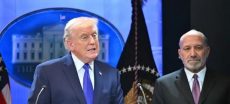Global stock markets have calmed after recent upheaval triggered by US trade tariffs. Yet, investors remain focused on the usually stable US bond market.
Governments sell bonds—essentially IOUs—to fund public projects, paying interest in return. Recently, US bond interest rates spiked unexpectedly while prices fell, signaling shaken investor confidence in the US economy.
Read moer: China Hits US Goods with 84% Tariffs amid Tensions
What’s a Government Bond?
A bond is a loan to the government. Investors, mainly banks and pension funds, buy them expecting steady returns. In the US, these are called Treasuries.
What’s Happening with US Bonds?
Bonds are typically safe investments. During market volatility, investors usually rush to buy them. But that’s not the case now. After tariffs were announced in early April, bond demand initially rose. But as policies toughened, investors began dumping bonds, pushing yields up sharply—from 3.9% to 4.5% for 10-year bonds and close to 5% for 30-year ones. Such movements are significant in bond markets.
This shift suggests doubts about the US economy’s stability, causing investors to demand higher returns for what they now view as a riskier investment.
Why It Matters to Everyone
Higher government borrowing costs can impact national budgets, reducing public spending. More importantly, it affects people and businesses directly. Higher bond yields typically lead to increased interest rates for mortgages, credit cards, and business loans.
Small businesses, especially those relying on credit, could suffer most. Homeowners may be shielded if they have long-term fixed mortgages, but potential buyers and movers may face higher costs.
Why It Pressures Trump
President Trump’s aggressive trade moves sparked this volatility. Initially defiant, he introduced a 90-day delay for higher tariffs on all countries except China. This change was likely prompted by the reaction from bond markets and lobbying by business leaders.
Similar to the UK Mini-Budget Crisis?
Some experts compare the US situation to the UK’s 2022 mini-budget disaster, which triggered a bond market meltdown. While the US Federal Reserve didn’t need to intervene, some analysts warned it might have if the sell-off worsened.
The China Factor
Though Japan holds the most US debt, China is close behind. Some speculated China might have dumped bonds in retaliation. However, experts say that would hurt China more than the US.











